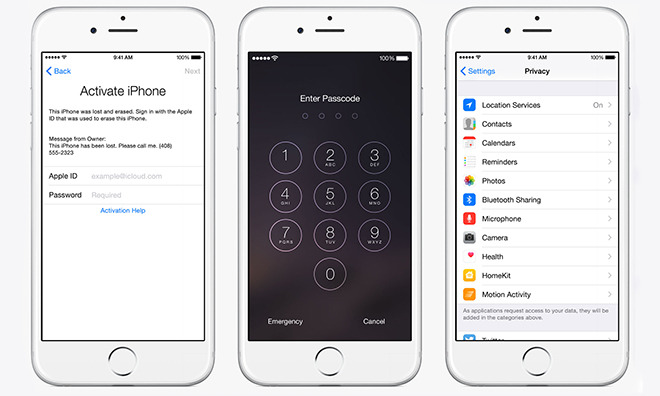In an "unprecedented" move, Apple on Monday issued a formal challenge to the UK House of Parliament over a proposed Investigatory Powers Bill that would leave services like iMessage open to backdoors and intercept capabilities.
Apple's eight-page submission to a parliamentary committee tasked with investigating the legislation takes issue with software backdoors, forced access to encrypted devices and overseas warrants, reports BBC. Protections against these three potentialities, and others relating to government snooping, are at the bedrock of Apple's stance on data privacy.
"The bill threatens to hurt law-abiding citizens in its effort to combat the few bad actors who have a variety of ways to carry out their attacks," Apple writes, according to reports Independent.ie. "The creation of backdoors and intercept capabilities would weaken the protections built into Apple products and endanger all our customers. A key left under the doormat would not just be there for the good guys. The bad guys would find it too."
Dubbed by some media outlets as the Snooper's Charter, the bill's language suggests a change to existing UK law that Apple argues leaves room for the creation of backdoors into services protected by end-to-end encryption. Backdoor access to personal communications is a contentious topic.
"A key left under the doormat would not just be there for the good guys. The bad guys would find it too," Apple said, echoing CEO Tim Cook's statement on backdoors from February.
Proponents of the UK bill, including Prime Minister David Cameron, say enhancing the government's data collection capabilities is a step toward thwarting terrorist plots. Encrypted digital communications has become a hot button topic after certain discreet messaging apps were connected to the recent attacks on Paris. The claims were unfounded, but fanned debate nonetheless.
"Some have asserted that, given the expertise of technology companies, they should be able to construct a system that keeps the data of nearly all users secure but still allows the data of very few users to be read covertly when a proper warrant is served," Apple's submission reads. "But the Government does not know in advance which individuals will become targets of investigation, so the encryption system necessarily would need to be compromised for everyone."
Apple brings up a separate issue of extra-territoriality, which require companies submit to UK law enforcement warrants for information. Under current law, and rules provided in the proposed bill, Apple would be forced to hand over data stored on offshore servers.
"The bill would attempt to force non-UK companies to take actions that violate the laws of their home countries," Apple said. "This would immobilise substantial portions of the tech sector and spark serious international conflicts. It would also likely be the catalyst for other countries to enact similar laws, paralysing multinational corporations under the weight of what could be dozens or hundreds of contradictory country-specific laws."
Perhaps more importantly, tech companies like Apple fear that adhering to a UK policy on extra-territoriality would open the door for other countries — China and Russia — to demand the same treatment.
Apple also has concerns about hardware hacking, or being forced to surreptitiously unlock and root around in customer devices at the will of UK authorities. This particular issue has raised the ire of U.S. officials, as strong encryption measures built into iOS 8 and iOS 9 make it impossible for even Apple to decrypt newer devices.
The UK parliamentary committee in charge of the Investigatory Powers Bill is expected to tender a final report in February.
 Mikey Campbell
Mikey Campbell







-m.jpg)






 Christine McKee
Christine McKee
 Wesley Hilliard
Wesley Hilliard
 Malcolm Owen
Malcolm Owen
 Andrew Orr
Andrew Orr
 William Gallagher
William Gallagher
 Sponsored Content
Sponsored Content









29 Comments
Are the British security experts really that dumb?
If they try to pass this stupid law I say drop them from all Apple devices and services.
When they open a new orifice for the whole world to up their *ss I am sure the Chinese, the Russians and not to mention ISIS will gladly oblige.
I wonder if the compromise is to make everyone absolutely secure but then un-secure the devices of the ones the governments have warrants for. AFTER the warrant is served.. any new data (messages, etc) is made available to law enforcement. It would be similar to wire taps in old tech. The government can tap a phone line with proper authorization but it can't get previous conversations before the tap went into effect. No volume data collection for no reason except.. "just in case we can go back and find stuff". Privacy is not guaranteed for those the government has warrants for.. it isn't now and in my opinion it should never be. If the government has reason to suspect someone and has gone through the right channels to conduct surveillance on you then (explained to judge and got a warrant) then it has the right to look through your windows, go through your garbage and track your car. What it doesn't have the right to do is track your car and save all your trash in a warehouse without a warrant so that if anything ever happens they can get a warrant and look back at your history. Leaving a door open for all to enter is just plain stupid... no matter how secure you think the door is.
Cameron is one of the most anti-democratic British leaders I've seen in a long time. These guys want to know everything we do. It makes civilised countries feel like Nazi Germany. The so-called "good guys" become more scary every year.
Go Apple!
Conitnue to poke a finger in the political fools' eyes. Here in the US, now in the UK, and everywhere else you can.